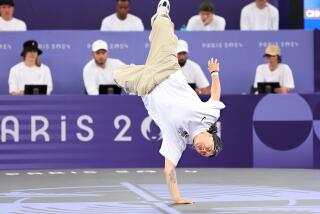Difference Too Steep for U.S. Women : Luge: Myler finishes fifth, best by any American. Austrians win the gold and silver.
- Share via
LA PLAGNE, France — The United States continued its long uphill slide in luge competition Wednesday by posting its best Olympic finish.
Cammy Myler, who felt sick to her stomach because of flu, wound up a healthy fifth place in the women’s singles. Although that wasn’t good enough for a medal, the U.S. team seemed fairly satisfied with the result.
“I’m disappointed, but I guess I have to look at that and feel all right,” Myler said.
The 24-year-old Dartmouth College student from Lake Placid, N.Y., missed a bronze medal by 0.47 seconds.
Austrian sisters Doris and Angelika Neuner, who had been first and second after Tuesday’s first two runs, won the gold and silver medals. Susi Erdmann of Germany won the bronze.
The U.S. women wound up with two finishes in the top 10 when Erica Terwillegar placed ninth.
Myler surpassed teammate Bonny Warner’s sixth-place finish at Calgary in 1988, which had been the best by any U.S. luger.
Much was expected from Myler, based on her second-place finish on the World Cup circuit, but the surprising speed of the Neuner sisters and her illness might have cost her a medal.
It’s just a matter of time before the United States wins a medal in luge, Warner said.
“There was a lot of pressure from the outside, from the media, but there is no doubt we now are capable of a medal,” said Warner, who finished 18th in her final Olympics. “That’s the key, to be capable. It’s a bummer not to be even capable of a medal.
“Yes, there’s going to be pressure in ‘94, but Cammy and Duncan (Kennedy) have now gone through the pressure, whatever pressure there was, and that will make them stronger in ’94.”
Kennedy, second in the World Cup, finished 10th Monday in the men’s singles, which is the best by a U.S. male. It also represents a slight improvement for the U.S. men’s team.
The United States put two in the top 12--Kennedy and Wendel Suckow. At Calgary in 1988, the United States placed two male lugers in the top 14. Myler and Terwillegar matched the U.S. women’s mark set in Calgary of two top-nine finishers.
U.S. Coach Wolfgang Schaedler said the luge program is still on schedule.
“Expectations were high this year,” he said. “We had an excellent World Cup season, don’t forget. If you look at the (World Cup) season, we should probably win at least one medal. But you can’t change history.
“The main plan was to medal in ‘94, but the season looked so good that it was realistic this year,” he said. “But ’94 will be the test.”
Schaedler said the U.S. team was hurt by the timing of the Olympic trials, which were held last month at Lake Placid.
“The main lesson we learned is about when the Olympic committee wants to hold the trials,” Schaedler said. “It took us away too long from international competition. We peaked too soon, for sure. The trials took too much out of us. And maybe next time, maybe we should make the trials on the track where the Olympics will be.”
Myler’s shot at a medal might have ended before she got on the track. She caught flu Monday night before the first two heats of the women’s singles.
Sixth after the first day, she was still weak during the final two runs. Track doctors treated her between heats, and she nearly passed out after the last run and had to be assisted from the track when her interviews were over.
Slight skids coming out of two turns during her last run also didn’t help.
“I’m definitely not feeling 100%, but I don’t want to use that as an excuse,” Myler said. “But it’s definitely hard, not feeling strong at the start where strength is so important.”
A four-time national champion and five times a medalist on the World Cup circuit, Myler said she will bounce back from her experience in the French Alps and try the Olympics again in the 1994 Games at Lillehammer, Norway.
“I’m not devastated,” she said. “I’m ready to go. I’m just looking ahead. A medal this year, I think it was a realistic thought, but it was just who slid the best. And it was the Austrians.
“I know people were expecting medals from us this time, but it’ll be more of a possibility in ‘94,” she said.
More to Read
Go beyond the scoreboard
Get the latest on L.A.'s teams in the daily Sports Report newsletter.
You may occasionally receive promotional content from the Los Angeles Times.






